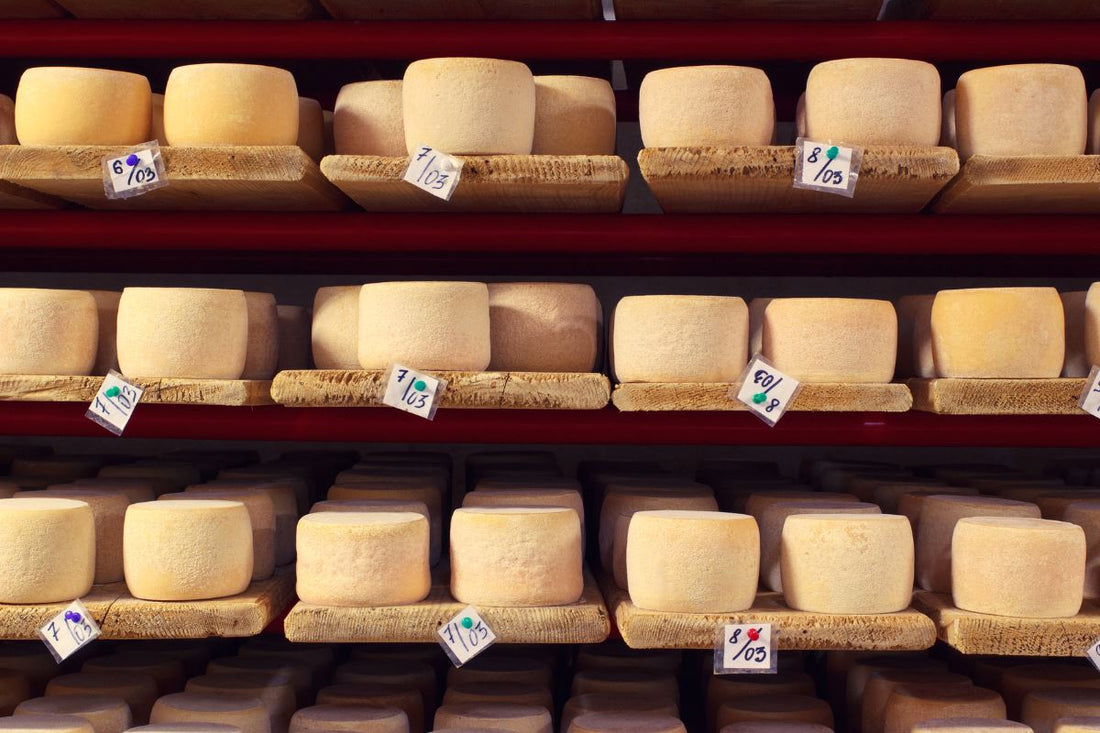Hello. I'm Kawatani, the owner of Fusubon!
Today, we will talk about cheese, which is essential for carbohydrate restriction. Although both dairy products contain milk, cheese has a relatively high carbohydrate content, whereas cheese has a low carbohydrate content, so it is also recommended for carbohydrate restriction!
It is also used as an ingredient that should be actively consumed in the MEC diet, which involves chewing each meal 30 times. First, let's look at the nutritional components contained in cheese.
Nutrients in cheese
 Scooping cream cheese
Scooping cream cheese
First, let's look at the nutritional components of cheese (natural cheese).
<Nutritional information per 100g> Carbohydrates: 1.4g, Calories: 356kcal, Protein: 28.9g, Dietary fiber: 0g, Fat: 25.0g, Sodium: 780mg, Calcium: 660mgAs you can see from the above, it is rich in protein and low in carbohydrates. It is also relatively rich in other vitamins and minerals, including 660mg of calcium, 640μg of vitamin A, and 0.42mg of vitamin B2.This information is taken from the page on Milk Products/Cheeses/Natural Cheese in the Standard Tables of Food Composition in Japan, 2015 Edition (7th Edition) .
The difference between natural cheese and processed cheese
What is natural cheese?

It is made by coagulating raw milk with lactic acid bacteria or enzymes and removing some of the whey protein, or by aging this. There are aged and unaged types. There are different types depending on the milk, microorganisms, and processing methods used, and you can enjoy a variety of flavors and textures. It is safe to assume that cheese with a short expiration date is natural cheese.
The intestinal regulation effect of lactic acid bacteria

Many people have heard that bacteria such as lactic acid bacteria contained in cheese and yogurt are useful for improving the intestinal environment. But does that mean that lactic acid bacteria that have died due to stomach acid or heat are completely useless?
Apparently it's not quite that simple.
First, let me explain the difference between dead and live bacteria. In the past, bacteria were considered to be alive if they continued to grow in culture, and dead if they did not.
As this would take a lot of time, it seems that now it is possible to determine whether bacteria are alive or dead by using "selective membrane-permeable dyes" that cannot penetrate the cell membranes of live bacteria but can penetrate the cell membranes of dead bacteria.
Therefore, the general consensus seems to be that if the cell membrane is ruptured, the cell is dead, and if it is not ruptured, the cell is alive.
Lactic acid bacteria have an intestinal regulating effect regardless of whether they are alive or dead.
I'm curious to know how much difference there is in the effects of live and dead bacteria on the body.When live lactobacilli or bifidobacteria of 10 to the power of 10 /g or more were ingested, the number of bacteria recovered from the feces was 10 to the power of 10/g, which is less than 1% of the normal number of bifidobacteria in the intestines (10 to the power of 10 /g), indicating that it is difficult for live lactobacilli or bifidobacteria to proliferate in the intestines even if they are ingested. (Omitted) From this perspective, the intestinal regulating effect seen when ingesting exogenous live lactobacilli and bifidobacteria, and bactericidal lactobacilli, is thought to be due to an indirect effect via the intestinal immune mechanism.Dr. Mitsuoka's Lactic Acid Bacteria Series: The effect is the same whether the bacteria are live or dead
As stated above, even if you ingest live lactic acid bacteria, they will hardly stay in your intestines, and even if the lactic acid bacteria are dead, the components of their cell walls will remain, so the health benefits mediated by the immune system will remain.
Therefore, consuming lactic acid bacteria, whether dead or alive, has a regulating effect on the intestines.
As the name suggests, there is an impression that containing bacteria is more natural and better for the body, but I found that it is fine to just consume it without worrying too much.
Since cheese is often eaten raw without being heated, a bacteria called Listeria can be a problem.
What effects does Listeria have on pregnant women and their fetuses?

Pregnant women, the elderly, and people with weakened immune systems (such as those undergoing chemotherapy or those with HIV/AIDS) can become ill with even a small amount of Listeria, leading to serious conditions such as sepsis and meningitis (listeriosis), and there have been confirmed cases of death overseas. In particular, if a pregnant woman becomes infected, Listeria can infect the placenta or fetus, causing miscarriage and affecting the newborn baby. (In 2010, an outbreak of Listeria food poisoning caused by cantaloupe (a type of melon) occurred in the United States, killing 33 people. Furthermore, most of the patients were over 60 years old, but one female patient was reported to have had a miscarriage.)Cited from the Ministry of Health, Labor and Welfare website, "Food poisoning caused by Listeria"
This is the case for natural cheese imported from overseas . Natural cheese imported from Japan is required by law to be heated, so Listeria is not an issue for domestic natural cheese.
Sometimes, pregnant women at Fusubon ask if the cheese we use is imported or domestic, but please rest assured that the cream cheese we use is domestic (made by Yotsuba Dairy).
What is processed cheese?

It is made by adding emulsifiers to natural cheese, heating it to melt it, and then molding it again.
The lactic acid bacteria are killed during the manufacturing process due to the heat treatment, so it has almost no effect on improving the intestinal environment, but it has the advantage of being longer lasting than natural cheese because it does not mature during storage.
A common product is 6P cheese. It is safe to assume that most cheeses with a long expiration date are processed cheeses.
Summary: Information on products using Fusubon cheese
Cheese, both natural and processed, is low in carbohydrates and rich in protein, vitamins, and minerals, so be sure to include it in your diet.
It is best to avoid imported natural cheese during pregnancy, due to the effects of Listeria on the mother and fetus.
Check out our products that use cheese here .
see you!





